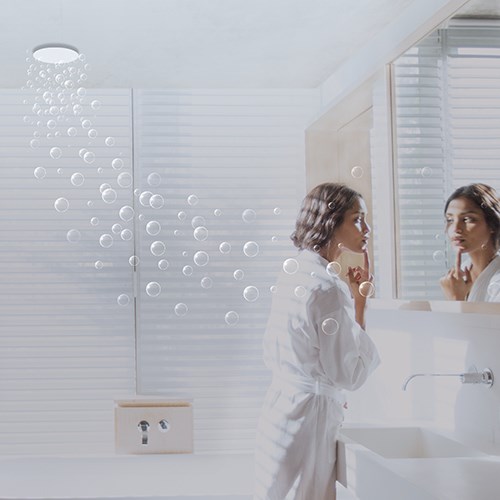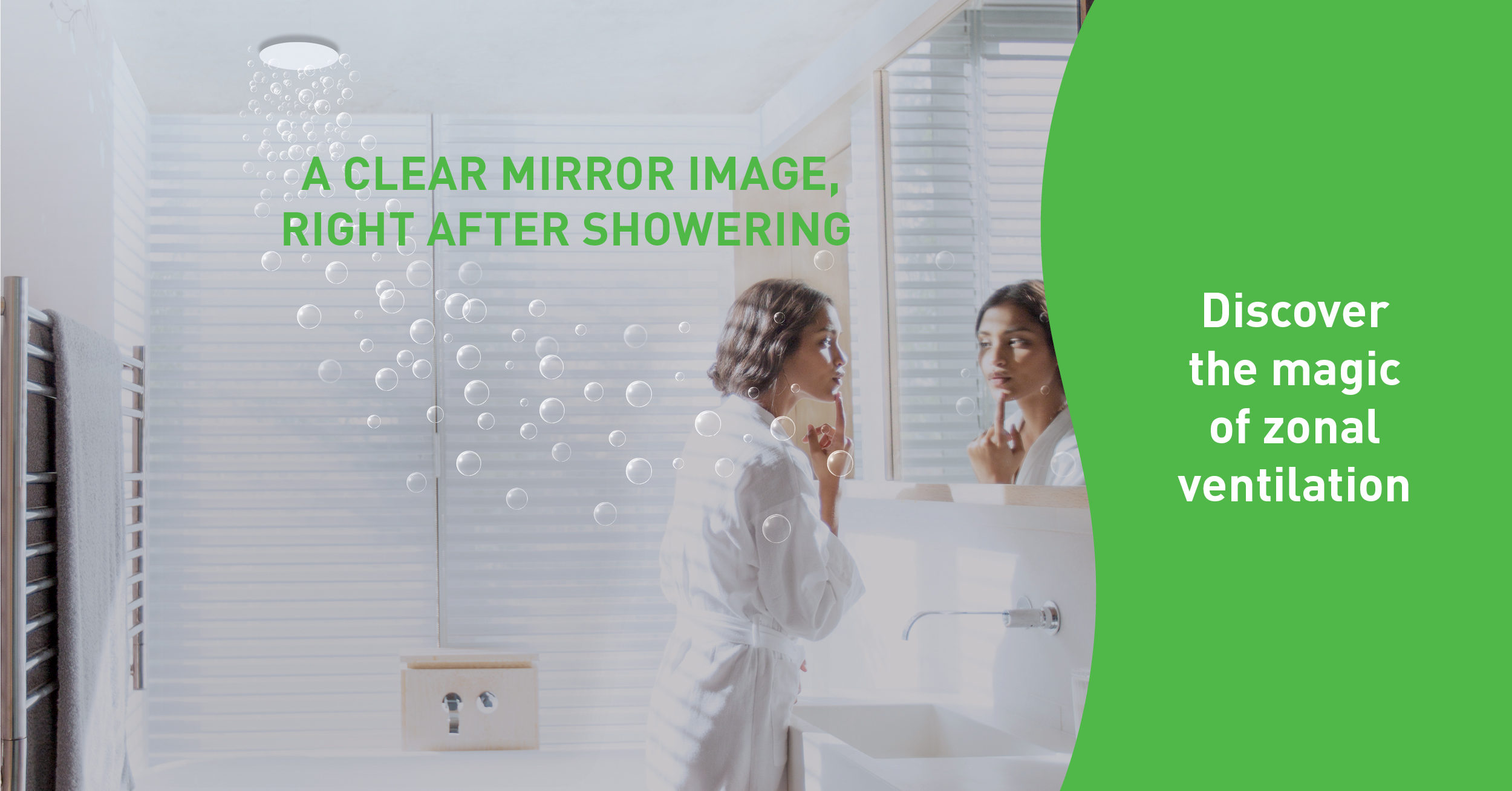May I switch off the ventilation system?

The ventilation system must not be switched off. You often hear this, but is it true? Yes, certainly. But in addition to the regulations, there are also a number of good reasons for this.
Modern houses are built with constantly improved insulation. You don't have as many holes and gaps as before, which means there is no longer a constant supply of fresh air. This is why you need a ventilation system.
When you switch off the ventilation system you actually create an airtight box. Fresh air can no longer enter and stale air can also no longer escape.
The consequences of this may seem relatively harmless, such as unpleasant odours. But unfortunately serious health complaints can also arise.
This is why we recommend not turning off your ventilation system.
4 reasons why it is best not to switch off the ventilation system
1. Moisture accumulation
People produce a fair amount of moisture in their homes. We produce 2 to 5 litres of water vapour each day just by our mere presence. And this does not take into account cooking, showering, taking a bath and mopping the floor. These would all bring the amount of water vapour up to around 15 litres.
This moisture has to go somewhere. A ventilation system transports the moisture outside while at the same time bringing in fresh air. This can be done fully mechanically or by a natural supply.
Moisture remains in the air once you switch off the ventilation. If this continues long enough, moisture problems can arise such as condensation on windows and a bathroom that stays wet for much longer.
This will eventually lead to damp patches on the wall or even mould, which can negatively impact one's health. Breathing can become impaired, particularly for young children and the elderly, and you can develop a cough and mucus.
In this case, prevention is certainly better than cure as moisture problems are difficult to eradicate completely.
2. Stale air in the home
First of all, CO2. We, after all, breathe this out practically all the time, every day of our lives. Certainly not in amounts that are dangerous, until you switch off the mechanical ventilation and spend the entire Christmas in the living room with your family. The levels of CO2 can then increase considerably. This can lead to headaches and fatigue.
There are also other possible hazardous substances. We use many chemical products when cleaning, and if you enjoy candles in your home the smoke produced can hang around for some time. Not everyone has a smoker at home, but they of course can also be a source of air pollution.
If the ventilation system is off then this polluted air remains in the home. This is not only unpleasant due to the odour, but it can also lead to coughing and respiratory complaints.
In short, enough reason to get this air out of the home. Detection of these substances is not always easy (with the exception of CO2) but this is not necessarily important.
All our ventilation systems function, after all, at a basic level if no command is given from a sensor or control. No large amounts of air are transported at this level, but enough to constantly remove various substances and to replace them with fresh air.
3. Energy efficiency
Particularly when it comes to energy efficiency, it is sometimes suggested that it is better to switch off the mechanical extraction. The reasons for this are fairly logical: a device that is operating less saves electricity This is certainly true when taken in isolation, but that does not take into account the long-term consequences.
The accumulation of moisture we mentioned previously also results in the home feeling more clammy and oppressive. This is a direct consequence of a relatively high air humidity. To remove this you would need to turn up the heat. So you would lose out on any “energy savings” you had gained by switching off the ventilation system.
In terms of energy it is therefore much more efficient to have the ventilation system continue at a low level, so that you do not end up having to turn up the heating excessively.
A brief aside: there are, of course, different types of mechanical ventilation. They are not all equally energy efficient. If you want one with the best energy efficiency you should opt for a system with heat recovery or a system that uses zonal ventilation. We will return to these possibilities shortly.
4. Illness prevention
Of less relevance for residential housing (but still worth mentioning) is, of course, illness prevention. This is a particularly important aspect of a ventilation system for schools and offices. The extraction of air contributes directly to a reduced spread of complaints such a colds and flu. Also during the corona period, ventilation was, with good reason, recommended as an important means to counter the spread of the disease.
Switching off ventilation: when may it be done?
There are exceptions, however, to when you can actually switch off the ventilation. It is permitted to temporarily switch off the ventilation system when maintenance is being carried out.
It is also possible for there to be a fire in the area whereby you are asked to keep windows and doors closed. Also in these situations it is permitted to switch off the mechanical ventilation system until the relevant authorities advise that the situation has been resolved.
What to do with the ventilation when I am on holiday?
This is not a problem. We have seen previously that switching off a ventilation system for a long time can lead to a larger energy consumption. Other devices would then have to work more to maintain the desired comfort level. The same principle applies here.
All the ventilation devices of DUCO are also equipped with an unoccupied setting. You activate this setting when you leave, after which the system will run a limited and efficient programme to keep the indoor climate to an optimum level until you return.
And what to do with the ventilation with very cold or very hot weather?
That is a good question. You do not have to worry about this: all our products are designed to deal with these temperature differences. You do not have to switch off the ventilation system in the winter or summer.
In the winter I draw in cold air. Surely I will need to heat more?
That's right. In the winter, cold air will come into the home. With an MEV system with central extraction, this cannot be avoided. The device would, however, have to run at a high level for a long time for your house to really cool down.
This effect is also reduced by a ventilation system with demand control or, even better, by zonal ventilation. Demand control is carried out by CO2 and/or humidity sensors and ensures that the device only extracts when it is necessary. This is an advantage compared to the manual control of the device
Zonal ventilation develops this, taking it a step further. The home is divided into zones, such as the kitchen, bathroom, toilet, etc. In this way, you ventilate not only when necessary but also where necessary.
The MVHR ventilation system not only extracts air, it also supplies air inside. This also has zonal ventilation but this is also supported by a heat recovery concept.
With heat recovery, you ensure that the heat that is lost when extracting air is transferred to the fresh air coming in. This keeps the temperature inside the home to the desired level.
In the summer I want to keep my home cool, but won't the ventilation bring in warm air?
This issue is similar to the above. Here again the ventilation device has to work hard to get the home truly warm and this effect is further reduced by equipping the ventilation system with demand and/or zone control.
There are also other very effective ways of keeping the heat outside. Many of our ventilation systems are equipped with night cooling, which means that during the summer nights they ventilate a little more than standard. In this way, they use the fresh night air all night to gradually cool the home.
And finally there are also other possibilities aside of the mechanical extraction. A properly installed and used solar shading for the windows will have an enormous impact on the temperature inside the house.
Conclusion: count on the system
Ventilation systems have been developed for good reason. The technology has improved enormously over the last ten years, and both the comfort of the occupant and the energy efficiency have been top priorities almost as long.
Assess your home as well as your needs and wishes, and select the most suitable system. Once it is installed and started up you can count on the system and a comfortable home.
Don't know where to start? We can help you on your way! Discover our ventilation units.
More blogs on ventilation and energy efficiency
- 3 Advantages of energy efficient ventilation
- How much energy does mechanical ventilation consume?
- Poor or insufficient ventilation in your home? These are the consequences
- Smart ventilation? Use a DucoBox!
- 6 advantages of CO2-controlled ventilation
- What to do with the ventilation when I am on holiday?
- 5 practical tips to efficiently ventilate damp rooms
